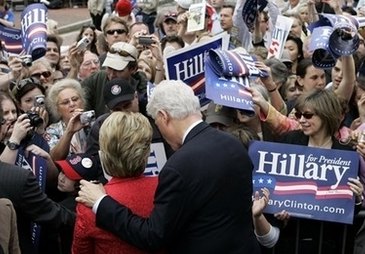Clinton reaches for Pa. win; Obama says he'll be close
(Agencies)
Updated: 2008-04-22 10:31
Updated: 2008-04-22 10:31
BLUE BELL, Pa. -- Hillary Rodham Clinton invoked Pearl Harbor, the Berlin Wall and Osama bin Laden as she reached for a victory in Pennsylvania's Democratic presidential primary to recharge her comeback effort.
Barack Obama said she would probably win but he hoped to keep it close in Tuesday's voting.
Clinton made her closing arguments Monday for the biggest primary left on the election schedule, running an ad with historic images to ask voters whom they would trust most in the White House during a time of trouble. It's the same tactic she used successfully in the "3 am" ad she aired in the closing days of the Ohio and Texas contests last month.
|
|
It was the first time a Democratic candidate has used bin Laden in a campaign commercial in the 2008 race for the White House. The terrorist appears along with images from the stock market crash, the bombing at Pearl Harbor, the Soviet threat, the collapse of the Berlin Wall and Hurricane Katrina as an announcer tells voters the political contest is for "the most important job in the world."
"You need to be ready for anything, especially now, with two wars, oil prices skyrocketing and an economy in crisis. Harry Truman said it best, 'If you can't stand the heat, get out of the kitchen.' Who do you think has what it takes?" the announcer says at the end, as Clinton appears on screen.
Obama spokesman Bill Burton said the ad "plays the politics of fear." And he said Clinton is to blame for allowing bin Laden to escape by supporting war in Iraq and diverting the US military.
"It's ironic that she would borrow the president's tactics in her own campaign and invoke bin Laden to score political points," Burton said.
Leaving the negative talk to aides, Obama himself tried to end on a positive note after days of escalating accusations against Clinton. He didn't criticize his rival as he spoke with voters at an outdoor plaza in suburban Philadelphia, where tulips and daffodils bloomed and children played in the background.
"I thought this would be a nice change of pace," Obama said. A bank of TV cameras captured the soft images -- early enough in the day to ensure that voters would see the images on Philadelphia newscasts the night before the primary.
Pennsylvania's demographics suit Clinton. The state has a higher median age, a higher percentage of whites, a lower median household income and fewer bachelor's degrees than the country overall. These are the voters -- working-class whites and voters older than 50 -- who have flocked to her in past contests.
Obama suggested in an interview with Pittsburgh radio station KDKA that Clinton probably would come out on top. "I'm not predicting a win. I'm predicting it's going to be close and that we are going to do a lot better than people expect," he said.
Clinton aides tried to keep expectations down, insisting they would be grateful for a win no matter how close. While the New York senator began the race with a hefty 20-point lead in several polls in the state, Obama's extensive campaigning and heavy TV ad purchases significantly cut into her lead.
She told supporters in Scranton, "We really need to bear down in these last few days. The whole world is watching."
Clinton was hoping a big win in Pennsylvania could boost her chance at the nomination. A loss would increase pressure on her to exit the race, with Obama leading in delegates and the popular vote.
The primary comes after a six-week break in voting that allowed Clinton and Obama to spend more time in Pennsylvania than in any state since the primaries and caucuses began at the first of the year.
Pennsylvania is the largest of the 10 contests remaining, with about 4 million registered Democrats and 158 delegates up for grabs in the primary. Polls were to open at 7 a.m. and close at 8 p.m. EDT.
|
||
|
||
|
|
|
|
